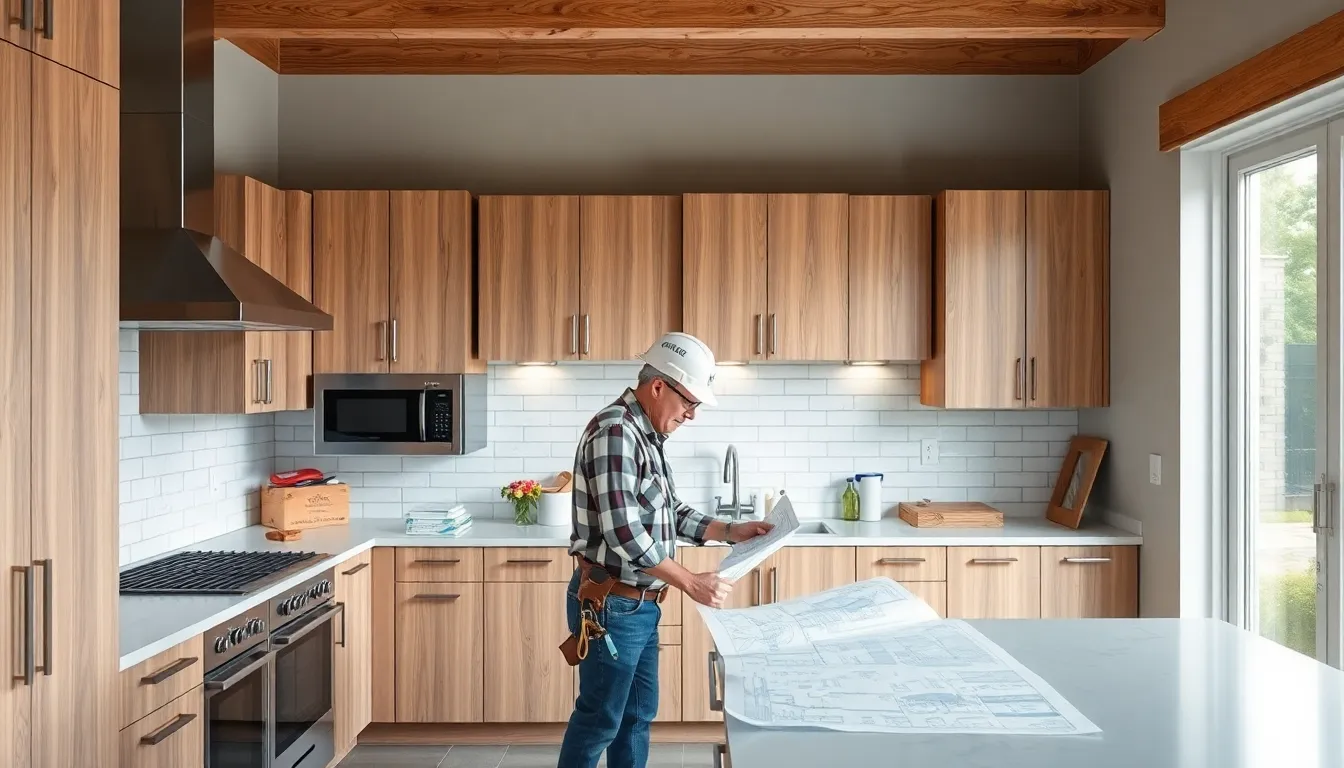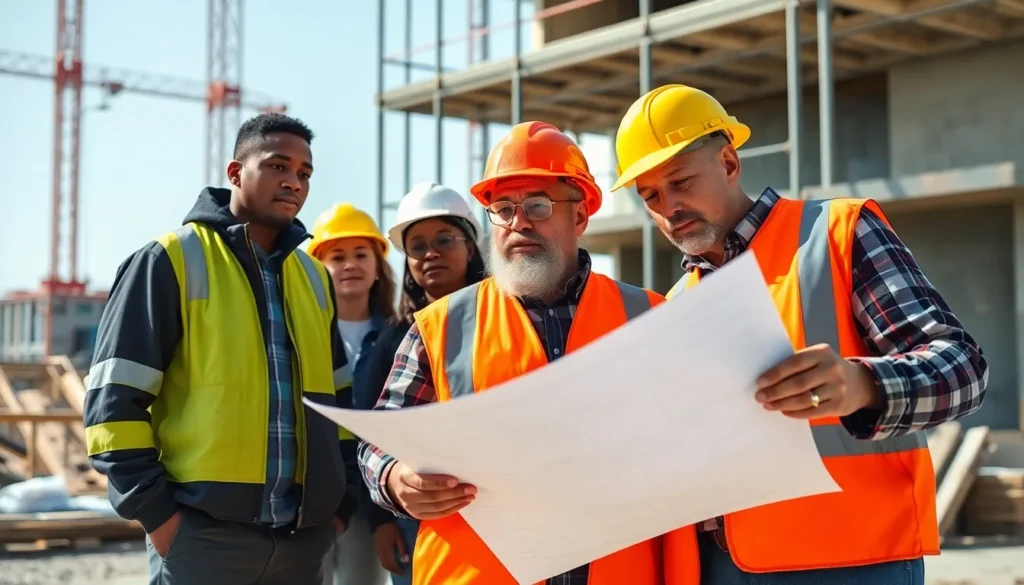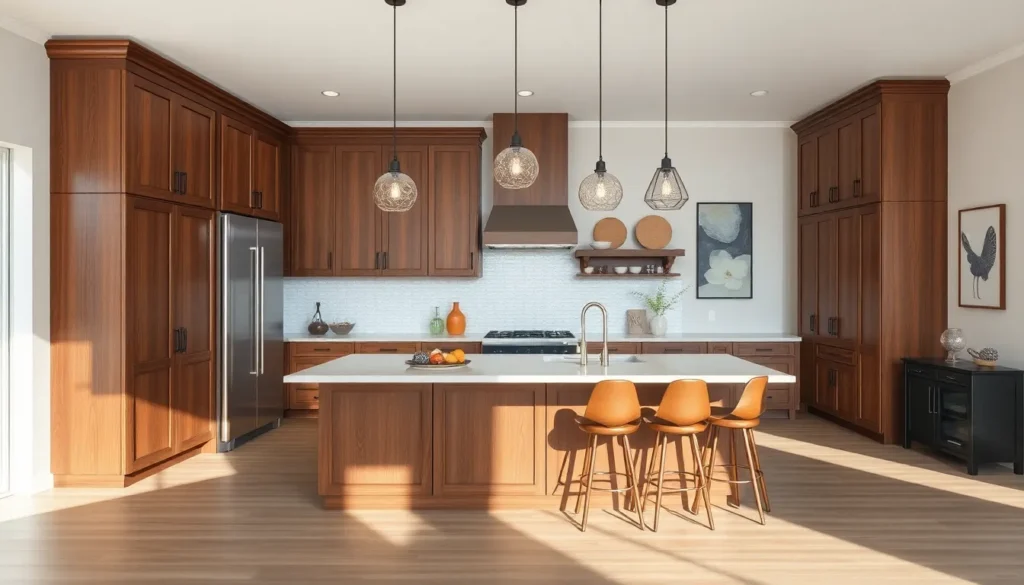Building renovation isn’t just about slapping on a fresh coat of paint and calling it a day. It’s an adventure that can transform a tired space into a vibrant masterpiece. Imagine turning that drab kitchen into a culinary haven or revamping a cramped living room into an open oasis. With the right vision and a dash of creativity, anything is possible.
But let’s face it, renovations can feel like a rollercoaster ride—thrilling yet terrifying. From unexpected surprises to budget-busting decisions, navigating the renovation maze requires a solid plan and a sense of humor. After all, who doesn’t want to laugh through the chaos of finding a hidden treasure behind that wall? So buckle up and get ready to explore the ins and outs of building renovation, where dreams meet reality and every nail hammered brings you one step closer to your dream space.
Table of Contents
ToggleOverview of Building Renovation
Building renovation encompasses various improvements and upgrades to existing structures. It involves aesthetic enhancements and functional updates aimed at increasing a property’s value. Renovating a building often includes modernizing outdated systems, such as electrical wiring and plumbing, ensuring they meet current standards.
Enhancements typically focus on energy efficiency. Implementing energy-efficient windows or insulation can significantly reduce utility costs. These upgrades not only benefit the environment but also improve occupant comfort.
Design choices play a crucial role in renovation projects. Selecting the right materials and layouts can transform a space. For instance, an upgraded kitchen with contemporary cabinetry and high-quality countertops leads to a more enjoyable cooking experience.
Planning remains essential throughout the renovation process. A detailed budget and timeline support efficient project management. Establishing potential costs and duration prevents unexpected surprises, which are common in renovations.
Building codes and regulations also demand attention during renovations. Familiarity with local zoning laws ensures compliance and avoids potential penalties. Working with licensed professionals can facilitate adherence to these regulations.
Understanding structural integrity is vital before initiating significant changes. Professional assessments of a building’s foundation or framework reveal any necessary repairs, ensuring safety and stability. Addressing these issues upfront can save time and money later.
Overall, the renovation process offers opportunities for creativity and personalization. People often view it as a chance to express their style and improve living conditions. The outcome can transform not just spaces, but also enhance lifestyles.
Types of Building Renovation

Building renovation includes many diverse forms that cater to different needs. Two major categories are residential renovation and commercial renovation.
Residential Renovation
Residential renovation transforms private homes by upgrading spaces like kitchens, bathrooms, and living areas. Common projects include room expansions, modernizing fixtures, and enhancing energy efficiency. Homeowners often prioritize styles that reflect their personal taste. For instance, installing smart home technology might improve convenience and security. Also, using sustainable materials enhances both aesthetics and environmental impact. Each renovation typically focuses on maximizing comfort and functionality while increasing property value. Attention to detail in design choices, such as cabinetry and flooring, can positively influence the overall atmosphere.
Commercial Renovation
Commercial renovation involves modifications to businesses and public spaces. This may include updating office layouts, enhancing customer areas, and complying with accessibility standards. Enhancing a storefront’s appeal can significantly attract more foot traffic. Renovators aim to create efficient work environments while reflecting a company’s brand identity. Upgrading infrastructure, such as HVAC systems, often leads to lower operating costs. Sustainable practices, like energy-efficient lighting, not only reduce expenses but also promote a green image. Each commercial project focuses on maximizing usability for clients and customers.
Benefits of Building Renovation
Building renovation brings numerous advantages, enhancing both the functionality and aesthetic appeal of properties. With thoughtful upgrades, spaces transform into more enjoyable environments, providing a compelling case for renovation projects.
Increased Property Value
Increased property value ranks among the top benefits of renovation. Upgrades often result in a significant return on investment, which is critical for homeowners and real estate investors. Updating kitchens and bathrooms tends to yield the highest returns. For example, a kitchen remodel can recover up to 80% of its cost when selling a home. Furthermore, modernizing features like flooring, fixtures, and appliances attracts potential buyers, positioning properties more competitively in the market. Ultimately, well-executed renovations boost a property’s marketability, appealing to buyers looking for contemporary amenities and improved functionality.
Improved Energy Efficiency
Improved energy efficiency also stands out as a key advantage of renovation. Upgrading windows and insulation significantly reduces energy consumption and lowers utility bills. For instance, energy-efficient windows can minimize heat loss by up to 20%, helping maintain comfortable indoor temperatures. Implementing smart home technology promotes energy savings through automated systems that optimize heating and lighting. Moreover, using sustainable materials and energy-efficient appliances contributes to a greener environment and decreased carbon footprints. Embracing these enhancements leads to reduced operating costs and creates a comfortable living atmosphere for occupants.
Challenges in Building Renovation
Building renovation presents several challenges that require careful consideration. Unforeseen structural issues often arise, leading to increased costs and extended timelines. Identifying these issues during initial assessments proves essential for effective planning.
Compliance with local building codes and regulations introduces another layer of complexity. Familiarity with zoning laws is critical to avoid fines and project delays. Engaging licensed professionals ensures adherence to these critical legal standards.
Budgeting a renovation project remains a common hurdle. Establishing a detailed budget at the outset helps control expenses. Unanticipated costs frequently occur, so including a contingency fund within the budget allows for financial flexibility.
Sourcing quality materials can also become problematic. Finding the right balance between cost and quality affects not only aesthetics but durability. Renovators must prioritize material choices that reflect both personal style and long-term sustainability.
Communication between contractors and clients is vital throughout the renovation process. Misunderstandings can lead to mistakes that compromise the project’s integrity. Regular check-ins and updates foster collaboration and help maintain alignment on project goals.
Time management poses additional challenges. Coordinating multiple tradespeople and schedules increases the potential for delays. Creating a realistic timeline aids in coordinating efforts, ensuring that milestones are met swiftly.
Navigating personal expectations presents its own set of difficulties. Individuals may envision perfect results, but actual outcomes can differ. Keeping an open mind and flexibility can lead to successful and satisfactory resolutions, despite any challenges encountered.
Key Considerations for a Successful Renovation
Planning plays a critical role in avoiding unexpected surprises during renovations. Establishing a detailed budget ensures that all expenses stay accounted for, leading to more efficient project management. Setting a realistic timeline allows for better coordination among contractors and tradespeople, minimizing delays.
Understanding local building codes is essential as well. Familiarity with zoning laws prevents compliance issues and potential penalties, making it crucial to engage licensed professionals when needed. Structural integrity must also be a primary focus. Professional assessments can identify necessary repairs or reinforcements, ensuring overall safety and stability in the renovation.
Selecting high-quality materials significantly impacts both aesthetics and durability. Cost-effective options exist for various materials; however, balancing quality with budget constraints remains a priority. Choosing the right design elements further enhances the overall transformation. Unique choices in cabinetry, countertops, and fixtures can elevate the ambiance of the space.
Communication holds immense importance throughout the renovation process. Clear dialogue between clients and contractors reduces misunderstandings, enabling smoother project execution. Keeping an open mind can assist in navigating personal expectations, especially given the potential challenges that arise.
Time management stands out as another vital consideration. Realistic timelines facilitate better planning, allowing projects to progress steadily without unnecessary stress. Including a contingency fund helps address unforeseen structural issues and other unexpected costs.
Ultimately, these key considerations pave the way for a successful renovation experience, enabling individuals to create spaces that reflect their style and improve their living conditions.
Building renovation presents a unique opportunity to enhance both functionality and aesthetics. By carefully planning and considering design choices, individuals can transform their spaces into personalized havens. The potential for increased property value and improved energy efficiency further underscores the importance of thoughtful renovations.
While challenges like budgeting and compliance with regulations exist, a proactive approach can mitigate these issues. Engaging licensed professionals ensures adherence to local codes and helps navigate any unforeseen structural concerns. Ultimately, embracing the renovation journey with an open mind and a solid plan can lead to rewarding results, allowing homeowners and businesses alike to create spaces that truly reflect their vision.









